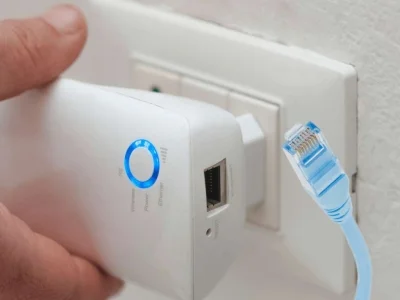Factors Affecting Your Internet Connection Speed
Type of Internet Connection
Internet connections can vary depending on the technology used to transmit the signal. The most common ones include ADSL, fiber optic, cable, and mobile connections. Fiber optic typically offers faster speeds and greater stability than ADSL or cable, while mobile connections may be slower and subject to fluctuations depending on coverage and network traffic.
Your Internet Service Provider's (ISP) Infrastructure
The quality of the network and the ISP's ability to manage data traffic influence your internet connection speed. If the provider lacks a solid and modern infrastructure, you're likely to experience slower speeds and poorer service quality. Traffic congestion, especially during peak hours, can also affect your connection speed.
Your Home's Location and Distance from the ISP Central Office
The distance between your home and the ISP's central office can affect your internet connection speed. The greater the distance, the more likely you are to experience latency and signal loss. Latency is the time it takes for information to travel between two points on the network, and higher latency can cause delays and connection issues.
Your Home Network Configuration
Your home network setup, including the router, connected devices, and quality of wiring, can also affect your internet connection speed. An old or poorly configured router can limit connection speed, while low-quality wiring can cause interference and signal loss.
Shared Internet Connection Usage
The number of devices connected to the network and the online activities you perform can also influence your internet connection speed. Bandwidth-intensive activities like streaming HD video or downloading large files can slow down the connection for all devices on the network.
How to Optimize Your Internet Connection Speed

To achieve the best connection speed, it's important to choose the type of internet connection that best suits your needs. Compare the speeds and features of different connection types, such as ADSL, fiber optic, cable, and mobile, to determine which option is most suitable for you. Updating your router's firmware and properly configuring the connection can significantly improve your internet speed. Ensure the router is placed centrally in your home to ensure a stronger, more stable signal. You may also consider using a network extender or Wi-Fi mesh system to improve coverage in areas with weak signals. Limiting the number of connected devices and bandwidth-intensive online activities can help improve your connection speed. Prioritize online activities and avoid using the connection for multiple bandwidth-intensive tasks simultaneously. Be sure to perform regular maintenance on your home network to maintain optimal connection speed. This includes replacing damaged or low-quality cables, disconnecting unused devices, and keeping the router and other equipment clean and dust-free. If you still experience issues with your internet connection speed after optimizing your home network configuration, it may be time to consider changing ISPs. Compare the speeds and features offered by different providers and choose one that offers a solid and modern network infrastructure, as well as good customer service. In summary, your internet connection speed depends on various factors, from the type of connection to your ISP's infrastructure and your home network configuration. By understanding these factors and following recommendations to optimize your connection, you can enjoy a faster and more satisfying online experience.Choose the Best Type of Internet Connection for Your Needs
Check and Improve Your Router Configuration
Control Shared Internet Connection Usage
Regular Maintenance on Your Home Network
Consider Changing Your Internet Service Provider (ISP)

(3).png)









